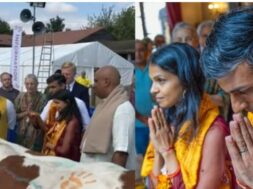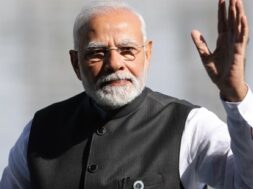
Religion: Why is the UK now a Christian-minority nation?
Virendra Pandit
New Delhi: Ahead of Christmas this month, the United Kingdom, whose vast empire was viewed as the single-biggest source for the spread of Christianity worldwide in the last five centuries, has itself become a Christian-minority nation.
And even its government is now headed by the Indian-origin Prime Minister, Rishi Sunak, tasked with protecting the retired country from the economic crisis. He famously wears his Hindu faith on his sleeves.
Officially, Christianity came to Britain in 597 AD when Saint Augustine, on a Pope-sanctioned mission to convert the pagans, reached there and converted the. Anglo-Saxons.
However, for the first time, less than half of the United Kingdom’s population is now Christian, according to the 10-yearly census carried out in 2021. It showed rapid growth for the Muslim population, but “no religion” was the second most common response after Christian, the Office for National Statistics (ONS) said.
For the first time, less than half of the population in England and Wales identifies as Christian, according to census data released this week, the media reported.
The pressures of secularism, democracy, and religious freedom in the UK are such that non-Christians have forced even Christians to stop sending them “Merry Christmas” greeting cards, claiming they ‘offend’ their sensibilities, and send “Season’s Greetings” instead!
The demographic and religious shift has mostly come after the dissolution of the British Empire and the influx of non-Christians from its former colonies after the Second World War. Even the East India Company, which spread the British Empire and Christianity initially, is now owned by an Indian-origin business owner, Sanjiv Mehta. Immigration from the Muslim world and Europe, especially from its east, has been another source of demographic change.
Now, these non-Christians outnumber the Christians.
In an increasingly secular age, Archbishop of York Stephen Cottrell said it was no “great surprise” that the Christian proportion was declining.
But, he said that facing a cost-of-living crisis and war in Europe, people still needed spiritual sustenance, the media reported.
“We will be there for them, most times, providing food and warmth. And at Christmas, millions of people will still come to our services,” said the archbishop.
“We will look beyond our immediate surroundings, remembering we are part of a global faith, the largest movement on Earth and its greatest hope for a peaceful, sustainable future.”
The British government added the question of religion in the UK Census 2001. Although it remains voluntary to answer, some 94 percent replied.
Nearly 27.5 million people, or 46.2 percent in England and Wales, described themselves as Christian, down 13.1 percentage points from 2011.
“No religion” rose by 12 points to 37.2 percent or 22.2 million, while Muslims stood at 3.9 million or 6.5 percent of the population, up from 4.9 percent before.
The next most common responses were Hindu (1.0 million) and Sikh (524,000), while Buddhists overtook Jewish people (273,000 to 271,000).
Data for Scotland and Northern Ireland, which have for long been trying to separate from the UK, are released separately.
The census found the number of people in England and Wales identifying their ethnic group as white had fallen by around 500,000 since 2011, from 86.0 percent to 81.7 percent.
The proportion identifying as white and from the British Isles stood at 74.4 percent, down six points from 2011.
The category of “other white” grew in a decade when Britain saw continued immigration from eastern Europe both before and after its Brexit referendum in 2016.
But the ONS noted respondents could also choose from more options than in 2011, encouraging them to list other identities.
The second most common ethnic group after white was “Asian, Asian British or Asian Welsh” at 9.3 percent, up from 7.5 percent a decade ago.
Within that group, most respondents identified their family heritage as Indian, followed by Pakistani, “other Asian,” Bangladeshi, and Chinese.
The next largest ethnic group was the fast-growing African population, followed by the Caribbean.
African evangelical churches have proliferated in London and elsewhere, providing some succor to the Christian share.













